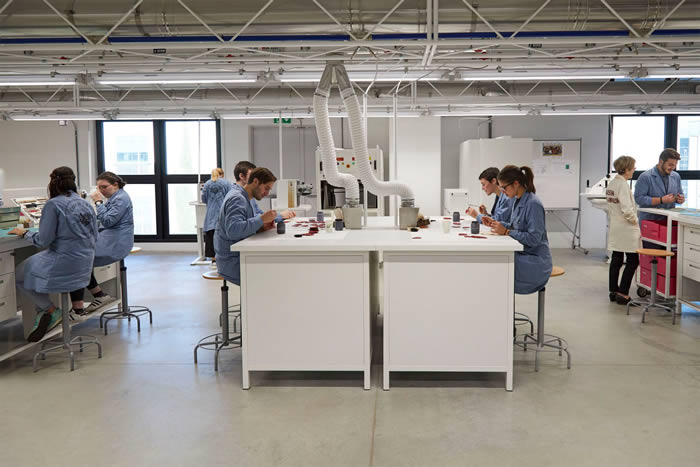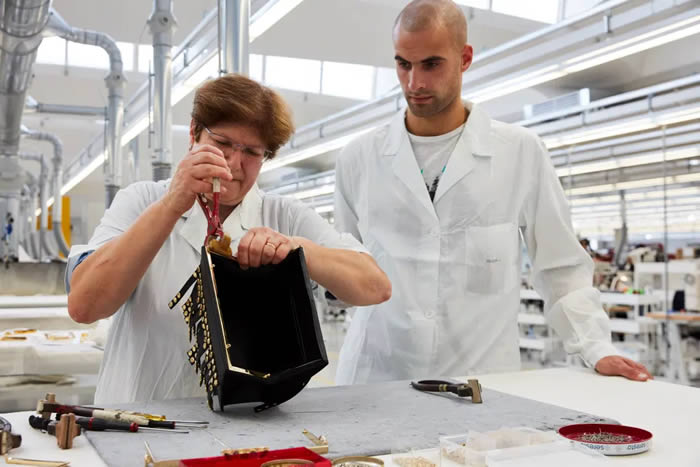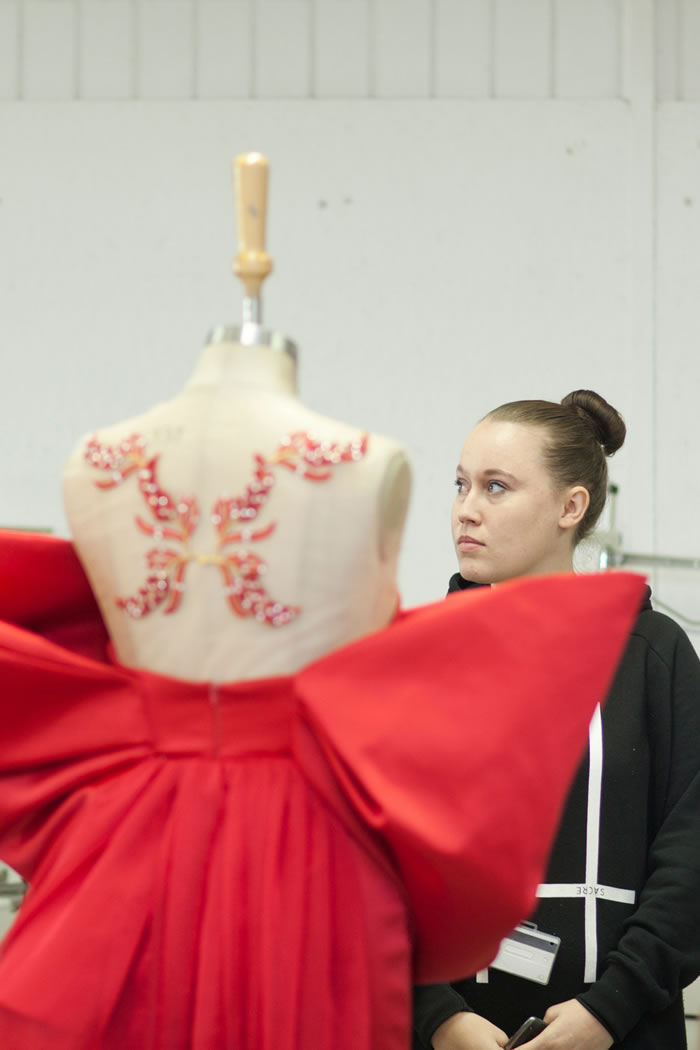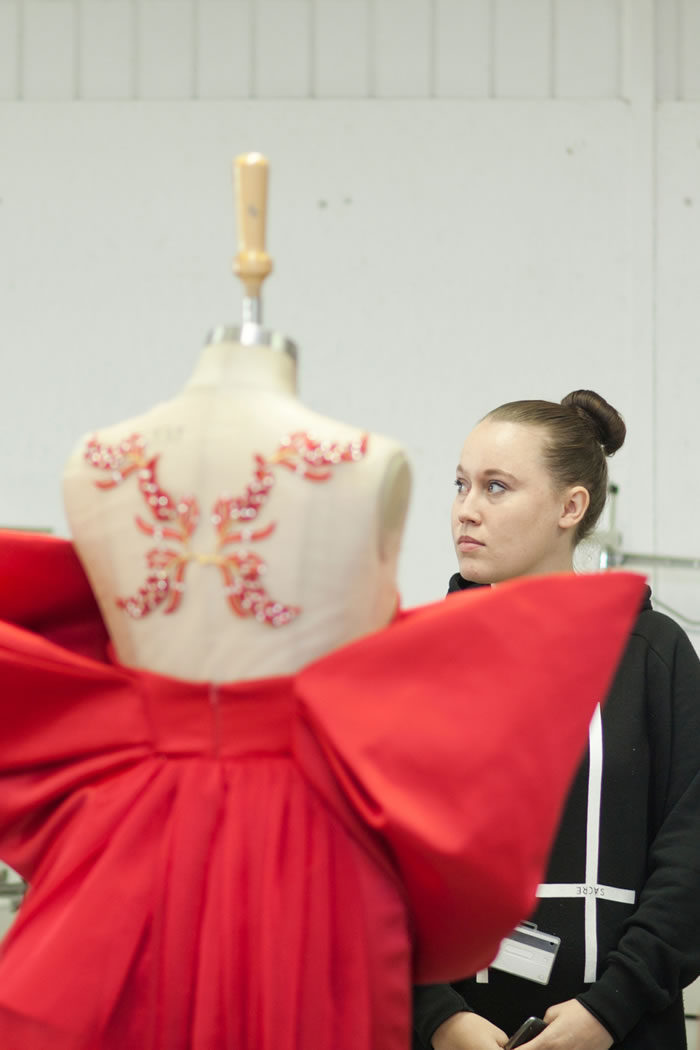“The human factor is fundamental, and people are a critical pillar for success in the fashion sector as it increasingly faces new challenges and where tradition and innovation coexist,” said Carlo Capasa, president of Italy’s Camera della Moda.
“Often when you think of fashion you think of designers, but fashion is made up of thousands of different jobs,” continued Capasa. “It is important to talk, to understand what companies need, to realize what the trends are, to bring added value to craftsmanship so that it is seen as cool, improving our storytelling.”
To this end, the Camera has created a human resources and education roundtable with associates Giorgio Armani; Bottega Veneta; Emilio Pucci; Etro; Fendi; Gucci; Max Mara; Missoni; Moschino; OTB; Prada; Roberto Cavalli; Salvatore Ferragamo; Valentino; Versace, and the Ermenegildo Zegna Group.
The main five strategic objectives were identified as: professional exchange, to understand trends in human resources; the power of communication; lobbying with associations and the government; innovation, ranging from digitalization to engagement, and diversity and inclusion, which is “one of the most important issues today,” Capasa said.
For the first time, the Camera conducted a survey to map out the quality of Italian fashion schools to understand how luxury companies perceived them, in order to strengthen interaction and stimulate schools to amend potential gaps perceived by the brands.
To support growth and to be competitive, many Italian companies have created their own internal academies, expanded in time from providing technical abilities to also offer managerial content.
“The luxury companies’ legitimacy in setting up the academies and their brands’ international appeal have been essential in maintaining the Italian tradition and craftsmanship,” Capasa said. In time, there has been an increased attention to soft skills, from teamwork to problem solving, he added.

“Prada in itself is a school. Our factories are the cradle of our industrial and artisanal knowledge. Our Academy project stemmed from this a few years ago, because I strongly wanted to pass on this knowledge to our young generations,” said Prada Group chief executive officer Patrizio Bertelli. “For us, the Prada Academy is not only a school of crafts, it’s a 360-degree training structure embracing all departments and skills; it’s a commitment to systemize our values and our know-how in a wealth of experiences and certainties for the present and the future of people in our sector.”
The Prada Academy seeks to convey professional expertise with projects, tools and training in three macro areas through the Industrial Academy; the Learning and Development Academy, and the Stores Academy.
Each path includes theoretical training (raw materials, manufacturing processes and techniques, such as technology, information technology and English language) as well as practical experience in the field through activities hosted by the group and its suppliers.
Besides traditional theoretical training, every employee can access a digital platform that allows continuous training and development. Prada also focuses on new ways to communicate with customers through digital technology.
“The heritage of Gucci is made up of people and their knowledge,” said Marco Bizzarri, president and ceo of Gucci. “Training is the most powerful method and tool we have to enhance our people and our products. It is no coincidence that École de l’Amour was born from the Gucci ArtLab, which is the perfect expression of the corporate culture that we are building and developing: a place that promotes learning and the development of skills, a laboratory of ideas, an environment where we work with passion; indeed, I should really say, where we work with love…”

Since 2018, 500 individuals have been trained at Gucci’s École de l’Amour at the industrial complex Gucci ArtLab. Located in Scandicci, outside Florence, Gucci ArtLab combines activities related to leather goods and shoes under the same roof in order to improve the sharing of skills and best practices.
The École de l’Amour includes a six-month craftsmanship school; a factory school, a bimonthly program in Gucci’s factories, with the objective of training people to become production workers specializing in specific leather goods manufacturing operations, and a technical academy, which offers specific technical training for Gucci employees working in different departments and in the Gucci factories.
Fendi has also long committed to the education and training of young talent through the Massoli Academy in Rome, which trains new tailors, and the participation in the LVMH Institute des Métiers d’Excellence training program.
During a WWD interview last month, Antoine Arnault, head of image, communications and environment at Fendi parent LVMH Moët Hennessy Louis Vuitton, underscored the importance of such programs. “Without shame, I can say that we could not continue our business without properly trained programs and they are directly linked to the success of our business,” Arnault said. “This is the right thing to do and robotization is not even in our mind. Italians should collectively be aware of and recognize more their treasures, and ensure they survive.”
“Italy is synonymous with tradition, history, beauty and, above all, excellence. We embrace the opportunity to invest in Made in Italy and to [celebrate] the core values of craftsmanship, artisanal savoir-faire and the power of handcrafting,” concurred Serge Brunschwig, chairman and ceo at Fendi. “Expertise and experimentation are all elements that support our marketing and company culture and at Fendi, we believe that keeping and transmitting this level of tradition is fundamental for the coming generations.”
Fendi has an internal school in Bagno a Ripoli where the students train in an area equipped with modern machinery and work tools that are used in the practical activities that make up 80 percent of the program, while there’s a meeting room for the remaining 20 percent, dedicated to theoretical training. The new planned Fendi Factory in Bagno a Ripoli will have even bigger spaces dedicated to this.
Salvatore Ferragamo has, for years, had an internal structure that helps train artisans, especially to develop shoes. At the same time, it works closely with schools such as the Accademia di Costume e Moda on accessories masters, with Bocconi University and with Polimoda, which all offer opportunities to “open up to the outside, to multi-ethnic cultures and to the new generations. This is fundamental for us,” said ceo Micaela le Divelec Lemmi, given Ferragamo’s size compared to larger luxury conglomerates.
“We believe that a truly complete creative talent’s knowledge should span from making prototypes to the market and communication dynamics,” said le Divelec Lemmi, who sees a “revitalized“ interest in the artisanal crafts compared to the past. “New jobs are arising with transversal and multitasking profiles.”
Brunello Cucinelli has created the Aurelian Neo-humanistic Academy, which hosts seminars on philosophy, history, architecture and spirituality in Solomeo, the medieval village outside Perugia, Italy, that he has restored over the years. There’s also a school of arts and crafts that teaches masonry, gardening and farming, tailoring, knitting, cutting and sewing, darning and mending.
“Students go to school from 8 a.m. to 1 p.m. with a monthly pay of 800 euros, I was adamant they should be paid,” said Cucinelli, who has long voiced his efforts to “give moral and economic dignity to work.” He views the socializing and cultural exchange between the students, artists and workers in Solomeo as fundamental. The courses usually last one year, except for the three-year courses to become a men’s tailor or a women’s wear seamstress. The company also has internal training courses.


